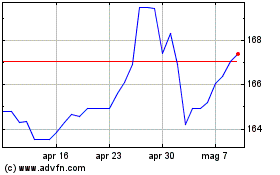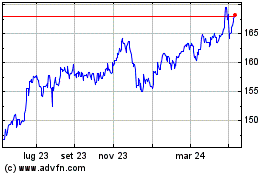Yen Falls After BoJ Ueda Signals No Rush To Hike
24 Settembre 2024 - 7:23AM
RTTF2
The Japanese yen weakened against other major currencies in the
European session on Tuesday, after the Bank of Japan's Governor
Kazuo Ueda signaled that the central bank is not in a rush to raise
interest rates.
In a speech in Osaka, western Japan, the BoJ Ueda said that the
bank will raise its key interest rate "in a timely and appropriate
manner while taking account of various uncertainties,".
He also added that the BOJ has "enough time" to assess
developments in financial markets.
In economic news, data from S&P Global showed that Japan's
private sector growth softened in September as manufacturing output
fell back into the contraction territory. The au Jibun Bank flash
composite output index fell to 52.5 in September from 52.9 in the
prior month.
The services activity growth strengthened to a five-month high
in September, while manufacturing output contracted for the second
time in three months. The flash services Purchasing Managers' Index
rose to 53.9 from 53.7 in the prior month. Meanwhile, the factory
PMI slid to 49.6 from 49.8 a month ago.
European stocks traded higher, with resource stocks likely to
surge after China's central bank announced a slew of measures to
spur sluggish economic growth.
The People's Bank of China said it would cut the reserve
requirement ratio by 0.5 percentage points in the near future.
The central bank also announced plans to reduce interest rates
on existing mortgages and standardize down payment ratios to
bolster demand in the property sector and stimulate growth.
In the European trading today, the yen fell to a 3-week low of
193.29 against the pound, from an early high of 193.29. The yen is
likely to find support around the 202.00 region.
Against the U.S. dollar and the Swiss franc, the yen slipped to
near 3-week lows of 144.68 and 170.55 from early highs of 143.38
and 169.36, respectively. If the yen extends its downtrend, it is
likely to find support around 149.00 against the greenback and
173.00 against the franc.
The yen edged down to 161.11 against the euro, from an early
high of 159.24. On the downside, 164.00 is seen as the next support
level for the yen.
Against the New Zealand and the Canadian dollars, the yen
dropped to a 3-week low of 90.74 and nearly a 3-week low of 107.06
from early highs of 89.80 and 106.00, respectively. The next
possible downside target level for the yen is seen around 92.00
against the kiwi and 109.00 against the loonie.
The yen edged up to 98.86 against the Australian dollar, from an
early low of 98.29. The yen had fell earlier to a 3-week low of
98.95 against the aussie after the Australia's central bank left
its interest rate unchanged at a 12-year high as widely
expected.
The policy board of the Reserve Bank of Australia governed by
Michele Bullock decided to maintain the cash rate target at 4.35
percent.
Looking ahead, Canada manufacturing sales data for August, U.S.
Redbook report, U.S. S&P Case-Shiller home price index for
July, U.S. Consumer Board's consumer confidence for September, U.S.
Richmond Fed manufacturing index for September are slated for
release in the New York session.
Grafico Cross Euro vs Yen (FX:EURJPY)
Da Nov 2024 a Dic 2024

Grafico Cross Euro vs Yen (FX:EURJPY)
Da Dic 2023 a Dic 2024
